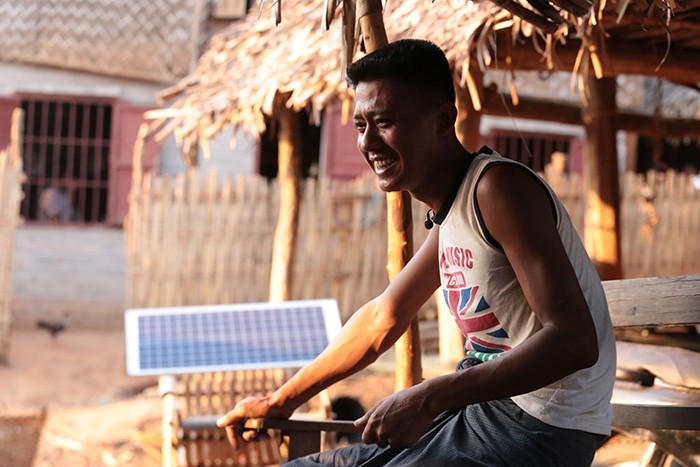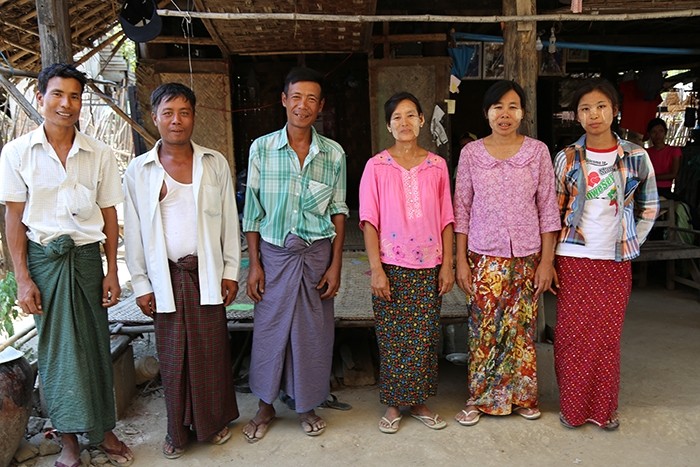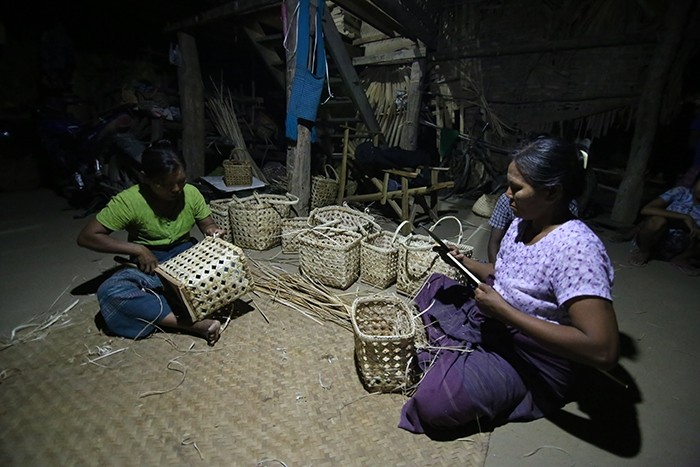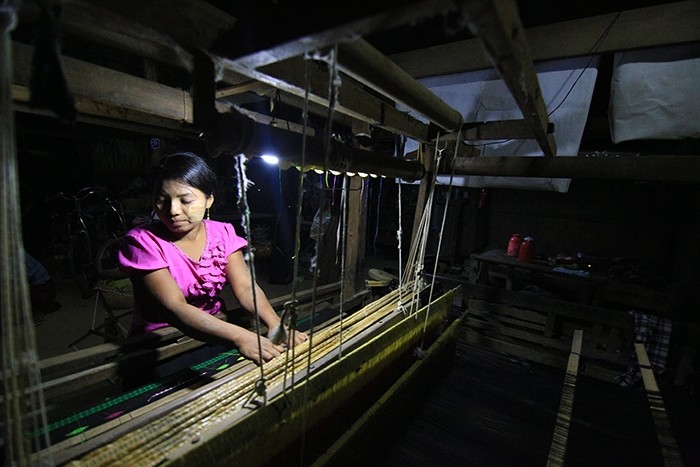Feature
With renewable energy, building prosperity in rural Myanmar
Sein Win May has spent more than her share of time in the dark.
At 51, she has lived her whole life in Shin Hla, a remote village of about 600 people in Myanmar’s Dry Zone that is accessible only by boat. Like most of the rest of the country’s vast rural stretches, Shin Hla has no grid electricity.
Sein Win May never married or had children. She supports herself. For the past two years, she’s done it by running a small shop attached to her modest house, where she sells cooking supplies, dry foods and snacks. If Sein Win May wanted to work before sunrise or after sunset, she did so under a single dim lightbulb connected to a battery. And that was in the best-case scenario. Her batteries drained quickly, and charging them was time-consuming and costly.
“It took a day to go to the place that refills them,” Sein Win May explains. “Sometimes I couldn’t go because I’m running my shop alone, and when I did, I had to pay a lot.”
Often, like most of her neighbors, she simply went without power.
Then last spring she heard about a new option. Pact was helping villagers buy solar home systems.
Sein Win May had heard of solar panels before, but no one was selling them near Shin Hla. She wouldn’t have been able to afford a system anyway – even a small one – and she wouldn’t have known how to use it or what kind was best. What if she got ripped off?
What Pact was offering, though, seemed doable. The systems were affordable, especially compared to other lighting options, and they could be paid for in manageable installments. Most important, Sein Win May trusted Pact. The organization had been working in Shin Hla for years, leading a development project that had significantly improved villagers’ lives, particularly in the areas of health, livelihoods, water, sanitation and access to credit. In fact, it was because of WORTH, a Pact economic empowerment program that helps women start small businesses, that Sein Win May had opened her shop.
She was tired of closing at sunset and counting the day’s earnings under that dim bulb. I want more, she thought.
Shin Hla’s Village Energy Committee, newly formed with Pact’s help, was making a list of who in the community was interested in solar power.
Sein Win May decided: I’m in.
…
It was Pact’s on-the-ground experience in Myanmar that led the organization to launch Ahlin Yaung. Meaning “light” in Burmese, the project is working to bring renewable energy to 1 million people in rural villages by 2021.
Pact had been working in Myanmar for years when, in 2011, it began an ambitious, wide-ranging development project called Shae Thot, or “The Way Forward,” with funding from USAID. Central to Shae Thot were Village Development Committees, or VDCs, comprised of democratically elected village members. Pact helped each VDC launch a fund to be used for village development projects. Starting with a little bit of seed money, VDCs grew their funds by making low-interest loans to community members. They used proceeds to pay for projects they decided on with their villages’ input, such as roads and schools.
“As we progressed, we saw that many, many villages were spending a large portion of their development funds on energy,” says Richard Harrison, Pact’s country director in Myanmar. “It was clear this was a huge unmet need.”
Other data supported that picture. Despite government efforts, about 70 percent of rural Myanmar has no grid electricity, and in villages that do, blackouts are routine. Research has shown that affordable, modern energy drives development, while its absence perpetuates cycles of poverty and limits progress in areas from education and livelihoods to health and food security.
“Without power, development stalls,” Harrison says. “We were seeing it firsthand.”
With funding from Chevron, Pact launched Ahlin Yaung in 2015. Other corporate partners soon joined the effort, including Shell and ABB.
“We’d already established a strong footing and relationships in thousands of villages,” Harrison says. “It allowed us to layer on this new intervention very efficiently.”

Rather than selling solar home systems itself, Pact brings communities and suppliers together and supports households to both be able to afford systems and to make the most of them.
“Before systems are purchased in a given village, we’re explaining the options to the community and bringing in suppliers for demonstrations so communities can really understand what’s available and what they can expect,” explains Sabine Joukes, Pact’s program director in Myanmar. “And we’re stressing that making productive use of power is the goal – using it boost your income and ultimately your entire standard of living.”
After purchases, Pact makes sure suppliers deliver quality systems.
Critically, Pact also provides loans to pay for systems, which cost households the equivalent of about $60 each. They pay 10 percent when they order a system and the rest in installments over the next nine months or so, at 2 percent interest.
Interest proceeds go to communities to add to their development funds. The principal goes back to Ahlin Yaung to provide energy loans in new villages. Village Energy Committees comprised of community volunteers help with Ahlin Yaung’s planning and administration, including collecting loan payments.

Supporting households to buy systems, rather than giving them away at no cost, is important, Joukes says.
“We know that when a household has nothing invested, it takes away that sense of ownership. Then if the system breaks, rather than fixing it, often times they just end up chucking it. That ownership is key to sustainability.”
So far through Ahlin Yaung, more than 200,000 people across central Myanmar have gained access to electricity, through solar home systems as well as through the electrification of community-prioritized places. Of the more than 10,000 households that have installed home systems, about half say they are using the electricity to be more productive, such as running businesses longer and more efficiently. About 80 percent say their children, now able to read and study past sunset, have gained educational benefits.


Compared to energy and light sources they were using before – including wood, kerosene, candles and diesel generators – solar is cleaner, safer and considerably cheaper.
“We were always buying more,” Khin Mar Cho, a mother of four in Seik Phyu Township, says of the candles and kerosene she used to use. “It was expensive, and I worried about leaving my children by them at night.”
More than once when it was windy, Khin Mar Cho says, her family’s house briefly caught fire.
Last year, she installed a solar home system with Pact’s help. Now she works on pots for her pottery business later into the evening, which has helped boost her profits. She recently made her last payment on the system and is spending far less on energy than before. She no longer has to pay a neighbor every time she needs to charge her cell phone.
“The solar panels are better for us,” she says.
U Mya Thein, a farmer in Salin Township who recently installed a solar home system, says electricity has transformed his evenings. Now that his living room is lit, friends gather there all the time after dinner.
“I’m very fond of this,” he says.
…
For all of the benefits solar home systems have brought, though, it isn’t enough.
“We know developing communities want and deserve more,” Harrison says. “To create real economic development, they need energy solutions that can do much more than power lights, fans and televisions. They need to power real industry.”
It’s why Pact is expanding its renewable energy work in Myanmar to include rural solar mini grids.
With mini grids, local private partners build the grids, which communities share, paying for energy based on household usage. Pact fills a role similar to the one it has played with solar home systems – bringing communities and mini grid developers together, educating communities, and helping communities finance start-up costs, such as connecting to mini grids. Pact also coordinates with Myanmar’s government, ensuring its efforts align with national electrification plans, and works with communities to help them create practical, relevant energy strategies.
With funding from Shell, Pact recently saw through its first solar mini grid project, in southern Myanmar, and more are underway.
“We’re moving beyond household-by-household electricity,” Harrison says, “to solutions that will do so much more for livelihoods and microenterprise development.”
Pact is also expanding its renewable energy work beyond Myanmar. The organization recently launched a global program called Energy for Prosperity that will grow Pact’s efforts to improve access to energy as part of its integrated approach to development.
“We know that clean, reliable and affordable energy is essential for development, and we see Pact as uniquely positioned to work with local communities throughout the world to overcome the challenges that have thus far prevented more than 1 billion people from gaining access to this basic resource,” says Matthew Cullinen, Pact’s senior director for renewable energy.
“We need to remove market distortions and work toward a future in which all people have the skills and resources they need to enjoy the many benefits of modern energy. This is something we’re deeply committed to.”
…
It’s a little past sunset in Shin Hla, and Sein Win May is switching on the lights at her shop. It’s been about eight months since she installed her solar home system. She is just about finished paying it off.
Was it worth it?
Absolutely, she says. As soon as her system was up and running, she began keeping her shop open later. With higher sales and profits, she has expanded her offerings, and plans to keep going.
“I am earning more and more,” Sein Win May says, and those day-long trips to charge batteries are a thing of the past.
“It’s so easy to turn the power on and off,” says her friend and neighbor, Wai Wai Aung, who installed two systems to light her home as well as a small tea shop she runs. In all, about a quarter of Shin Hla’s households now have solar.
“Before, when I used a diesel generator, I needed help to start it, and it was loud and smelled,” Wai Wai Aung says.
With solar, she can begin preparing for her customers well before sunrise, which works perfectly, as her tea shop does most of its business in the morning.
Why didn’t she get a solar home system sooner?
Before Pact, she says, she didn’t know they existed.